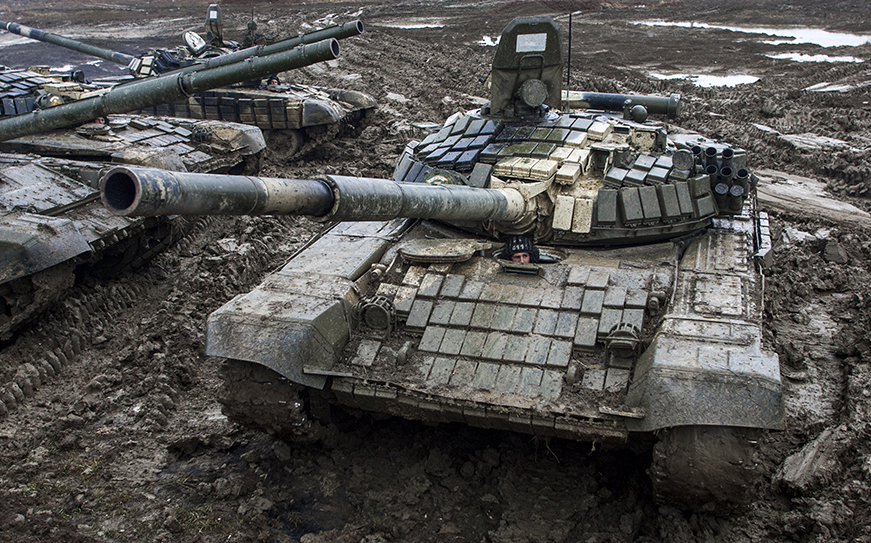Should the USA Put a Foot into Ukraine’s Matters?
Ministry of Defence of the Russian Federation
Russian T-72BM tank in use in Chechnya Russian Ministry of Defence
The US should put troops in Ukraine
Russia has made no mistake about its expansionist desires. The Ukraine region is a vital buffer zone for Russia. When Russia annexed Crimea in 2014 they destabilized the region, getting the public to turn against the Crimean government, then invaded relatively unopposed. What is happening in Ukraine right now is textbook Russian destabilization. If things continue as they have in Crimea they will look like this:
It’s early-March 2022, and tensions between Ukraine and Russia have heated to a boil. Russian troops exceed 150,000 on Ukraine’s eastern border. Intense protests have erupted from the capital city Kyiv between pro-Ukraine and pro-Russian-Federation demonstrators. They are funded partly by the wealthy oligarchs, who make it the third most corrupt country in the world and would benefit significantly from political destabilization. Russian forces move in.
The European Union does little to retaliate against Russian aggression. Germany cannot afford to lose Russia’s oil. The United States unleashes a torrent of sanctions that have never been seen before under the Magnitsky Act. Foreign assets owned by Russia are frozen, and many high political and military officials are prohibited from entering the U.S. Devastating sanctions on Russia’s oil trade throw the economy into a tailspin. But as the months passed, Russia, China, and all the other dictators of the world sense a growing weakness: the U.S. is unwilling to protect foreign democracy.
America has become wearier and divided by war in recent years. In a September 28, 2021 poll reviewed by Reuters: “Of the 2,168 surveyed, 42.3% believe the United States should cut the number of troops in Europe, Asia, and the Middle East, reduce its commitments to defend countries there and gradually shift regional security responsibility to allies.” Of course, 42.3% is no majority, but only 32.2% want to boost or maintain levels, and 25.5% have no opinion.
America is undergoing a new wave of populism from the left and right, pushing attention away from our allies and to within our borders — or on them. However, this is shortsighted because foreign supply chain shortages have stifled the U.S. economy. Foreign affairs have a bigger impact than ever before.
But these Americans have other reasons too. The United States has entered many wars whose enemies were trained and funded by the United States. The United States has also entered many conflicts with justifications thinner than public-school toilet paper.
These conflicts all have one major flaw; they were fundamentally for our own immediate protection. When we go to war to neutralize a threat, we pay little attention to the region that created that threat in the first place.
When Americans arrived in Afghanistan, they encountered little meaningful protest from the civilian population that had been starved and oppressed. Coalition forces capitulated much of Afghanistan in two months and pushed back the Taliban. The Government that was formed after that, while better than the Taliban, was immeasurably corrupt.
The military agency charged with investigating Afghanistan rebuilding efforts, SIGAR, said Afghans would have to “bribe to a government official to get something the government should otherwise be providing, such as basic access to health care, justice, or education.”
After American coalition forces subdued much of the middle east after the initial invasion, we left the pieces to be picked up by the very same corrupt rulers and tribal chiefs that brewed the threat in the first place.
The corruption, compiled with the highly publicized American airstrikes that often included collateral damage, made Afghans weary but ready for the Coalition to leave. On August 6th, the Taliban seized their first provincial capital. By the 15th, the Taliban was firmly in control of Afghanistan. After more than a decade of war, America had accomplished nothing that lasted. Understandably, this has created a distaste for such aggressive military intervention.
Replaced by military intervention, diplomats have entered the era of sanctions. Sanctions notoriously kill more civilians than stop the dictator. However, it makes sense that in the war-weary United States, most Americans are unbothered by foreign humanitarian issues. And who really cares? Those countries can fight over their own sandpit; we have our own issues. To be fair, this doesn’t stop investment into our military even though soldiers are mostly drinking lager in German bases and scowling at Chinese warships in the Yellow Sea.
Why do we spend so much on the military? We spend 740 billion dollars, to be precise. To win a world war? No, atom bombs ended that prospect 76 years ago. To project our power, we say, to show countries we’re there. The projection we say — while titanic carriers lay in the Persian Gulf overlooking the atrocities occurring in the middle east.
If we limit our military bases to the confines of friendly, western states, we leave the African continent to be plundered again by unscrupulous dictators. We abandon eastern Europe, Indochina, and the Middle East to become oppressive states with little regard for the rule of law. If a country does not protect its people, it is the job of the United States to do so.
The effects of building strong foreign relations cannot be understated. America is no longer in a bipolar world where it’s the West versus the Communists. Today we live in a world where ties are weaker — dominated mostly by economic and protection reasons over ideological ones. This is partly because of the collapse of the USSR but also the collapse of American intervention abroad.
America should put American boots on the Ukraine border, on the shores, and in the strait of Taiwan. Not to neutralize some threat but to protect our allies, to protect budding democracies abroad. The last time a standing army began a conflict with America was WWII.












